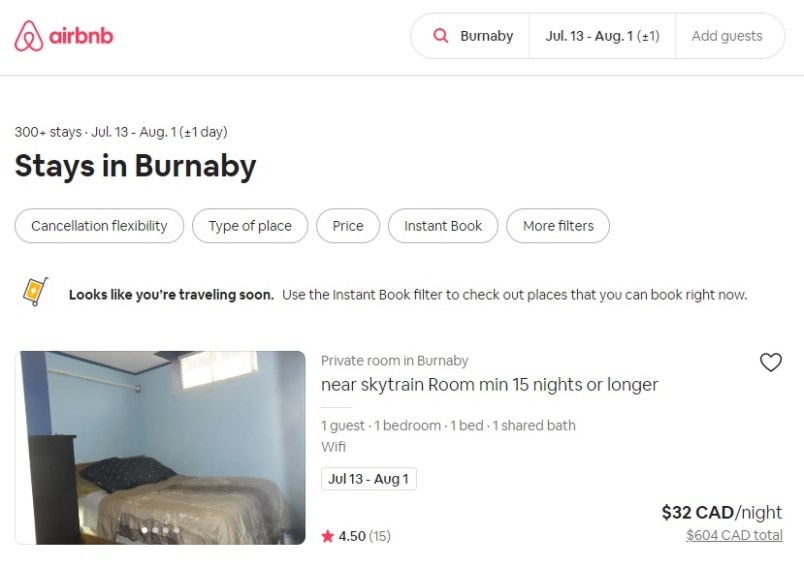Twelve years after Airbnb was founded and swept in a revolution in hospitality, the City of Burnaby has introduced a set of bylaw amendments set to enforce regulations and licensing for short-term rentals.
In July, council approved a report setting out a regulatory framework, giving city staff the go-ahead to develop bylaws for enforcement and licensing. Staff returned to council earlier this month with a set of amendments to the zoning bylaw, business licence bylaw, the business licence fee bylaw and the bylaw notice enforcement bylaw. The amendments are expected to go to a public hearing late next month.
The framework recommended the four objectives for the city to focus on in its regulations: protecting long-term rental supply; maintaining and improving neighbourhood livability and stability; supporting economic opportunities, including for tourism and for local businesses and residents; and providing a clear set of regulations that can easily be complied with.
The proposed regulations would limit short-term rentals to principal residences; ban short-term rentals in long-term rental units, secondary suites and flex units; limit rentals to 90 nights per calendar year, including 28 in which the owner can be absent from the home; limit rentals to four unrelated people or six related people; and require short-term rental operators to get a $250 annual business licence from the city.
These regulations, according to the city, would protect housing stock for both tenancy and ownership, reduce the impacts of short-term rentals on the surrounding neighbourhoods, and allow the city to track and enforce regulations for short-term rentals in Burnaby. At the same time, it would allow homeowners some opportunities to rent out their home for additional income.
Depending on the violation, operators found not to be in compliance with the regulations would face fines of $200 to $500, with discounts for those paying their fine within 15 days.
“This should put an end to people buying condos for speculation because they can make a lot of money renting it on Airbnb, and obviously such things are needed for long-term accommodations for Burnaby residents or Greater Vancouver residents,” said Coun. Pietro Calendino, with the Burnaby Citizens Association, who is also chair of the city’s planning and development committee.
Coun. Colleen Jordan, an independent, said she didn’t see how the city will be able to enforce the bylaws “without a little cadre of bylaw officers scanning the internet and checking people’s houses to see who’s living there this weekend.”
“I get that Airbnb is a problem, and I think we should have focused on that, but getting down to this level … is something that’s just going to be a nightmare, and I think it’s gone way, way, way too far,” Jordan said.
Coun. Sav Dhaliwal, with the BCA, said it’s “about time we brought this in,” pointing to a recent Canada Mortgage and Housing Corporation report that indicated 11,000 condos were added to Vancouver’s rental market in the last year.
On Nov. 26, the CMHC released its report, which found nearly 2,300 new condos were added to the rental market, while more than 8,800 were being used by owners for another purpose prior to becoming long-term rentals.
The CMHC credited the B.C. government’s vacancy tax, Vancouver’s empty homes tax and new regulations from the City of Vancouver around short-term rentals for at least some of those units, according to a Canadian Press report.
Dhaliwal said the province should have been doing this work years ago.
“In the absence of the province not doing their jobs, local governments are doing the best they can to provide housing, which is what this is all about. This has been about a real affordability issue about housing,” Dhaliwal said. “This is one way to really (deal with) that.”
The city anticipates holding a public hearing on Jan. 26, 2021 for the zoning bylaw amendments, along with an opportunity for public submissions on the regulations.
Follow Dustin on Twitter: @dustinrgodfrey
Send him an email: [email protected]



